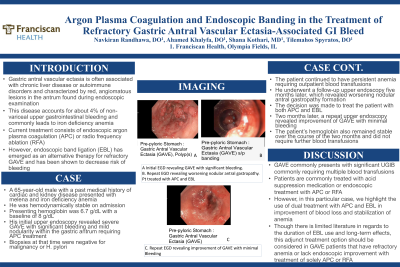Back


Poster Session A - Sunday Afternoon
Category: GI Bleeding
A0328 - Argon Plasma Coagulation and Endoscopic Banding in the Treatment of Refractory Gastric Antral Vascular Ectasia-Associated GI Bleed
Sunday, October 23, 2022
5:00 PM – 7:00 PM ET
Location: Crown Ballroom

Has Audio

Navkiran Randhawa, DO
Franciscan Health
Olympia Fields, IL
Presenting Author(s)
Navkiran Randhawa, DO1, Ahamed Khalyfa, DO1, Shana Kothari, MD2, Tilemahos Spyratos, DO1
1Franciscan Health, Olympia Fields, IL; 2Franciscan Health Olympia Fields, Olympia Fields, IL
Introduction: Gastric antral vascular ectasia (GAVE) is often associated with chronic liver disease or autoimmune disorders and characterized by red, angiomatous lesions in the antrum found during endoscopic examination. This disease accounts for about 4% of non-variceal upper gastrointestinal bleeding (UGIB) and commonly leads to iron deficiency anemia. Current treatment consists of endoscopic argon plasma coagulation (APC) or radio frequency ablation (RFA). However, endoscopic band ligation (EBL) has emerged as an alternative therapy for refractory GAVE and has been shown to decrease risk of bleeding.
Case Description/Methods: A 65-year-old male with a past medical history of cardiac and kidney disease presented with melena and iron deficiency anemia. He was hemodynamically stable on admission. Presenting hemoglobin was 6.7 g/dL with a baseline of 8 g/dL. His initial upper endoscopy revealed severe GAVE with significant bleeding and mild nodularity within the gastric antrum requiring APC treatment. Biopsies at that time were negative for malignancy or H. pylori. The patient continued to have persistent anemia requiring outpatient blood transfusions. He underwent a follow-up upper endoscopy five months later, which revealed worsening nodular antral gastropathy formation. The decision was made to treat the patient with both APC and EBL. Two months later, a repeat upper endoscopy revealed improvement of GAVE with minimal bleeding. The patient’s hemoglobin also remained stable over the course of the two months and did not require further blood transfusions.
Discussion: GAVE commonly presents with significant UGIB commonly requiring multiple blood transfusions. Patients are commonly treated with acid suppression medication or endoscopic treatment with APC or RFA. However, in this particular case, we highlight the use of dual treatment with APC and EBL in improvement of blood loss and stabilization of anemia. Though there is limited literature in regards to the duration of EBL use and long-term effects, this adjunct treatment option should be considered in GAVE patients that have refractory anemia or lack endoscopic improvement with treatment of solely APC or RFA.
Disclosures:
Navkiran Randhawa, DO1, Ahamed Khalyfa, DO1, Shana Kothari, MD2, Tilemahos Spyratos, DO1. A0328 - Argon Plasma Coagulation and Endoscopic Banding in the Treatment of Refractory Gastric Antral Vascular Ectasia-Associated GI Bleed, ACG 2022 Annual Scientific Meeting Abstracts. Charlotte, NC: American College of Gastroenterology.
1Franciscan Health, Olympia Fields, IL; 2Franciscan Health Olympia Fields, Olympia Fields, IL
Introduction: Gastric antral vascular ectasia (GAVE) is often associated with chronic liver disease or autoimmune disorders and characterized by red, angiomatous lesions in the antrum found during endoscopic examination. This disease accounts for about 4% of non-variceal upper gastrointestinal bleeding (UGIB) and commonly leads to iron deficiency anemia. Current treatment consists of endoscopic argon plasma coagulation (APC) or radio frequency ablation (RFA). However, endoscopic band ligation (EBL) has emerged as an alternative therapy for refractory GAVE and has been shown to decrease risk of bleeding.
Case Description/Methods: A 65-year-old male with a past medical history of cardiac and kidney disease presented with melena and iron deficiency anemia. He was hemodynamically stable on admission. Presenting hemoglobin was 6.7 g/dL with a baseline of 8 g/dL. His initial upper endoscopy revealed severe GAVE with significant bleeding and mild nodularity within the gastric antrum requiring APC treatment. Biopsies at that time were negative for malignancy or H. pylori. The patient continued to have persistent anemia requiring outpatient blood transfusions. He underwent a follow-up upper endoscopy five months later, which revealed worsening nodular antral gastropathy formation. The decision was made to treat the patient with both APC and EBL. Two months later, a repeat upper endoscopy revealed improvement of GAVE with minimal bleeding. The patient’s hemoglobin also remained stable over the course of the two months and did not require further blood transfusions.
Discussion: GAVE commonly presents with significant UGIB commonly requiring multiple blood transfusions. Patients are commonly treated with acid suppression medication or endoscopic treatment with APC or RFA. However, in this particular case, we highlight the use of dual treatment with APC and EBL in improvement of blood loss and stabilization of anemia. Though there is limited literature in regards to the duration of EBL use and long-term effects, this adjunct treatment option should be considered in GAVE patients that have refractory anemia or lack endoscopic improvement with treatment of solely APC or RFA.
Disclosures:
Navkiran Randhawa indicated no relevant financial relationships.
Ahamed Khalyfa indicated no relevant financial relationships.
Shana Kothari indicated no relevant financial relationships.
Tilemahos Spyratos indicated no relevant financial relationships.
Navkiran Randhawa, DO1, Ahamed Khalyfa, DO1, Shana Kothari, MD2, Tilemahos Spyratos, DO1. A0328 - Argon Plasma Coagulation and Endoscopic Banding in the Treatment of Refractory Gastric Antral Vascular Ectasia-Associated GI Bleed, ACG 2022 Annual Scientific Meeting Abstracts. Charlotte, NC: American College of Gastroenterology.
